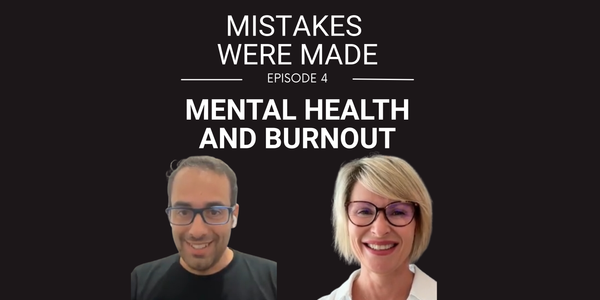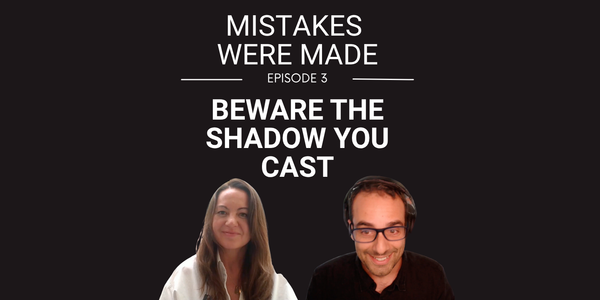It’s Not Your Boss’s Job to Grow Your Career

Every week I talk to someone early in their career who’s hungry for growth, they want the next step, the promotion, the recognition. The ambition is fantastic, but there’s one small problem: career growth isn’t something your boss does for you. It’s something you drive yourself.
Why this matters:
In this piece, I share what I’ve learned about taking ownership of your career, how to build your personal board of directors, work with your boss (not for them), and grow faster without waiting for permission.
Early lessons
Early in my career, I struggled to find people who would actually mentor me. Not people who’d give me orders or performance feedback, but those who’d take the time to listen, guide, and help me figure things out.
It was hard to find. I was ambitious, impatient, and a bit rough around the edges. I wanted to learn fast, to get better, and to prove myself. But many of the senior people around me weren’t interested in coaching. They’d built their authority around being the expert, not the teacher. Knowledge was something they protected, not something they shared.
And in a lot of companies back then (and let's be honest, probably still today) that was the culture. Everyone was fighting for the same scrap of bread, chasing recognition, credit, or the next promotion. When you’re in that kind of environment, generosity disappears. People stop sharing ideas, stop helping each other, stop being curious.
That experience shaped a big part of how I lead today. Because what I eventually realised is that it doesn’t have to be that way. You can build a career and an organisation that grows through generosity, curiosity, and learning. But to do that, you’ve got to take ownership of your own growth, and you’ve got to build your own network inside the business.
Your career is your responsibility
Here’s the hard truth: it’s not your boss’s job to develop your career. Thinking otherwise is a HUGE mistake.
Your boss is not lying awake at night in a cold sweat, worried about your next promotion. That’s not neglect, it’s reality. Their job is to deliver outcomes for the organisation and to help open doors for their people. Your job is to walk through those doors and bring others with you.
I see this pattern all the time. People early in their career are absolutely craving growth. They want promotions, development plans, visibility, all of it. The ambition is fantastic, but often they haven’t been shown the technique, process, or network they’ll need to actually make it happen.
It's easy to fall into the trap of thinking that career development is something that happened to you. Your manager will decide it was time for a course, a promotion, or a stretch project. But that’s passive. Real development is active. It’s seeking out people who challenge you, watching how great leaders handle pressure, asking for advice, reflecting on feedback, and trying again.
If you rely solely on your boss to grow you, you’ll always be limited by their time, their perspective, and their energy. The best people I’ve ever worked with don’t wait for that, they build what I call their personal board of directors.

Build your own board of directors
Every organisation is full of people who can teach you something. Your peers, your seniors, even the quiet operators who’ve been around forever and just get stuff done.
Find them. Ask questions. Show them what you’re working on. Share your wins and your mistakes. After a big meeting, ask someone you respect, “What’s one thing I could have done better?”
When you make it clear that you’re open to learning, people will respond. Most experienced leaders actually want to help. They just don’t know you’re looking for it.
And here’s the key point, you are the chairperson of your own board. Your boss might be a member, maybe even a critical one, but you run the agenda. You drive the cadence. You decide what guidance to seek and when.
As Jeff Smith said in my first Podcast episode, “The fastest way to build trust is to be useful.” Go in humble. Volunteer to help. Jump on the unglamorous work. It’s a quick way to learn, to build credibility, and to show you’re serious about growing.
If you can, find mentors outside your direct reporting line. Someone who isn’t judging your day-to-day performance but can give you perspective. As Ross Rotherham pointed out in Episode 2, mentors share experiences; coaches help you think differently. You’ll need both.
Culture makes or breaks this
Of course, this only works if the organisation creates space for it.
When the culture is all ego and competition, people stop learning. Knowledge becomes currency, not connection. But in a culture where the growth of the individual is praised and encouraged, where everyone wants everyone else to succeed (as it benefits the whole organisation), where mistakes are seen as inputs, and where curiosity is rewarded, people grow faster and so does the business.
Leaders have a responsibility to model that. Make learning visible. Invite people into your process. Admit what you don’t know. Jeff Smith once told me that credibility doesn’t come from the job title; it comes from consistency, replying to requests for help quickly, showing up, following through, and being decent to people. That kind of consistency sets the tone for a team more than any motivational speech ever will.
If you want people to seek coaching, be coachable yourself. If you want people to take feedback well, show how you take it.
How to start
If you’re early in your career, stop waiting for someone to build your development plan.
Start by building your network:
- Pick three people in your company who do something you admire. Ask for a short chat about how they approach it.
- After a big meeting or presentation, send someone you trust the recording and ask for advice… not feedback, advice. (“What would you do differently next time?” works wonders.)
- Offer to help. Take on something that scares you a bit. That’s where the learning happens.
- Be generous. Share what you learn. Help others coming up behind you.
If you’re more senior, make it easy for people to approach you. Be the person you wish you had early in your career. Don’t hoard your experience as a source of authority; use it to lift others.
The payoff
I wish someone had told me this when I was early in my career. I spent years waiting for the “right” boss or the “right” opportunity to appear. The turning point was realising I could create those moments myself.
When people grow, the organisation grows. It’s that simple.
I’ve seen it time and again. Teams where people share ideas, teach each other, and ask for help are the ones that outperform everyone else. People make fewer repeated mistakes because people talk about the mistakes that were made. They build trust faster because they learn together.
The best part? It’s contagious. Once people see that learning, sharing, and mentoring are normal, the whole culture shifts. The walls between hierarchy and experience start to soften.
So, take ownership of your career. Build your own board. Learn from everyone you can.
And if you’re a leader, create the space for people to learn & grow.
Let’s keep the conversation going
Who’s on your personal board of directors? And if you don’t have one yet, who could you ask this week?
Hit reply and tell me! I’d love to hear what’s working for you.
If this resonated with you, share it with someone just starting out, or check out the first two episodes of Mistakes Were Made with Jeff Smith and Ross Rotherham. They are both full of ideas on trust, learning, and owning your growth.
Oh, and if you haven’t subscribed please consider it. I know you get 100’s of emails, but my subscriber only posts should deliver high value against everything else in your inbox!




